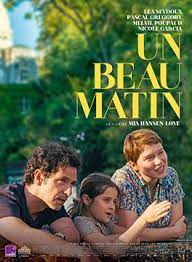
ONE FINE MORNING/ UN BEAU MATIN
France, 2022, 112 minutes, Colour.
Lea Seydoux, Pascal Greggory, Melvil Poupaud, Nicole Garcia, Camille Laban Martins, Fejria Deliba.
Directed by Mia Hansen-Love.
International audiences have come to look forward to films by writer-director, Mia Hansen Love. Her stories are very humane, portraits of sympathetic characters, characters in conflict, probing deep human relationships.
And this is the case here. The focus is on Sandra, a very strong and persuasive performance from layers say do. But, in fact, there are two focal gazes at Sandra. The first is her relationship with her ageing father, a philosophy professor, his health is deteriorating, physically, mentally, his becoming more confused, blind, in need of care. The father is played by veteran actor Pascal Greggory. The father, Georg, has been divorced for 20 years but his ex-wife, Nicole Garcia, still shares responsibilities for him, along with his companion of five years, Leila, Fejria Deliba. However, Sandridge seems to take responsibility as a major carer, constantly visiting her father, becoming involved, along with her mother, for finding the best place for her father’s care – which includes visits to hospitals, interviews with doctors, interactions with carers, visits to aged care facilities, not without stress on each member of the family as well is adding to the confusion and deterioration of the father.
This theme would be a film in itself.
However, there is another major focus, this time with Sandra herself, a single mother, devoted to her daughter (who can be wilful at times), primary school age. The film offers many scenes between mother and daughter. However, this is also the story of love-affair. Sandra encounters a past friend, a friend of her daughter’s father (absent from the film), Clement, Melvil Poupaud, who describes his scientific career as a Cosmo-chemist, collecting from all around the world particles from outer space and analysing them. There is a visit to his working centre and his vast machine for analysis. But, Sandra is passionately in love with him, many meetings, intense, her daughter befriending Clement and enjoying his company. However, we see Clement initially with the son so we know there are complications, that he is married.
Mia Hansen-Love is able to combine the two major strands of her story, the audience identifying with Sandra, empathetic with her devotion to her father, wondering, questioning about the ultimate resolution of the affair.
This is a very French film in its sensibilities, in greatest portrait of characters and relationships.
- The title, the later reference to one of Georg’s books? The ending and the sunshine?
- French sensibility, characters, situations, relationships? Ageing, care? Marriage, failures, sexual relationships? Children?
- The city settings, streets, driving through Paris, hospitals and aged care homes, apartments, school, outings? The musical score?
- The focus on Sandro, Leo’s sake do and her presence, performance? Age, at home with her daughter, taking her to school, to the doctor…? The past, Lynn’s father? Her relationship with her mother? With her sister? Aunt? Her relationship with her father, care for him?
- Georg, his background, Vienna, library, his marriage, divorce, professorship, philosophy, his companionship with Leila for five years? His deteriorating health? Physical, mental, confusion? Blindness? Sandra and her care, her visits, his dependence on her? His memory slipping? His wife, her visits, taking responsibilities? His sister, his other daughter? His health situation, leaving home, packing up, the library and those taking the books? The hospital, the doctors, the nurses, visiting the aged care homes, the elderly, wandering, meals, sing songs? Is finally settling?
- Sandra, her relationship with Lynn, love and care, Lynn and her wilfulness, contradicting her mother? The encounter with Clement, Lynn relating well to him, the outings? The frank discussions about the relationship? The bed seen? Her limp, the doctor, growing pains?
- Sandra and her mother, 20 years of the divorce, her mother and her protesting, the various campaigns, narrating her stories, arrests, causes?
- Clement, is signs, travels, cosmo-chemist, the visitor’s office, the vast machine? Friendship with Sandra, friend with Lynn’s father, Clement and his marriage, his son? Taking up the relationship with Sandra, the effect on her, in love, intense, preoccupation, his response? It is marriage, his son? The pauses, his communications, going back to his wife? The effect on Sandro? His coming back, decisions, the story of the holiday on the Amalfi coast, the audience not seeing it? Only the result?
- The audience identifying with Sandra, as a daughter and her concern about her father, her help? As a mother, her care for Lynn? Her relationship with her mother? Her relationship with Clement, intense, disappointments, weeping? The final happiness?
- The impact of the film, audience response to the two major themes, aged care, personal love and relationships?